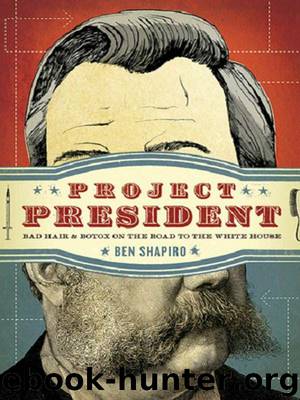Project President: Bad Hair and Botox on the Road to the White House by Shapiro Ben

Author:Shapiro, Ben [Shapiro, Ben]
Language: eng
Format: mobi
Tags: ebook, book
Publisher: Thomas Nelson
Published: 2008-01-14T16:00:00+00:00
Dogs have been indispensable political tools ever since.
It was all part and parcel of FDR’s warm image. FDR’s fireside chats revolutionized the art of politics, bringing presidents closer than ever to the people. His first fireside chat took place in 1933. Robert Trout of CBS introduced him: “The president wants to come into your home and sit at your fireside for a little fireside chat.” Alter described the speech: “His speaking voice was a beautiful and relaxed tenor, not the contrived basso profundo of pompous politicians . . . A leader who began each radio speech by calling the people ‘my friends’ must be . . . friendly.”80 Of course, that voice was carefully prepared: before each fireside chat, Roosevelt had his nasal passages swabbed with ointment to improve that “beautiful and relaxed tenor.” Roosevelt’s aide, Tommy Corcoran, said that Roosevelt “looked upon a speech with the same care that a prima donna would take care of her voice before a singing appearance.”81
Throughout his career, the press was exceedingly kind to FDR. Aside from protecting FDR’s paralysis from the intrusive eye of the camera, the media also saw FDR as a savior of sorts. After his election in 1932, the Cincinnati Free Press praised FDR’s optimism in glowing terms: “There is something contagious about the cheery smile and innate confidence.” The New York Daily News went further, simultaneously labeling FDR an incipient American dictator but praising that dictatorship: “A lot of us have been asking for a dictator. Now we have one . . . Dictatorship in crises was ancient Rome’s best era . . . The impression we get from various quarters is that practically everyone feels better already. Confidence seems to be coming back with a rush, along with courage.”82
FDR was an aristocrat, but he was a “second-class aristocrat,” in the words of a young lawyer of the time. He connected with the people on their level, with humor, good cheer, and a peppy bravura that would guide America through the Depression and World War II.
Download
This site does not store any files on its server. We only index and link to content provided by other sites. Please contact the content providers to delete copyright contents if any and email us, we'll remove relevant links or contents immediately.
The Secret History by Donna Tartt(19090)
The Social Justice Warrior Handbook by Lisa De Pasquale(12190)
Thirteen Reasons Why by Jay Asher(8912)
This Is How You Lose Her by Junot Diaz(6887)
Weapons of Math Destruction by Cathy O'Neil(6281)
Zero to One by Peter Thiel(5802)
Beartown by Fredrik Backman(5755)
The Myth of the Strong Leader by Archie Brown(5508)
The Fire Next Time by James Baldwin(5446)
How Democracies Die by Steven Levitsky & Daniel Ziblatt(5219)
Promise Me, Dad by Joe Biden(5154)
Stone's Rules by Roger Stone(5088)
A Higher Loyalty: Truth, Lies, and Leadership by James Comey(4964)
100 Deadly Skills by Clint Emerson(4926)
Rise and Kill First by Ronen Bergman(4789)
Secrecy World by Jake Bernstein(4753)
The David Icke Guide to the Global Conspiracy (and how to end it) by David Icke(4720)
The Farm by Tom Rob Smith(4514)
The Doomsday Machine by Daniel Ellsberg(4490)
